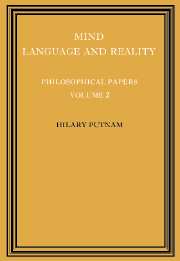Book contents
- Frontmatter
- Contents
- Dedication
- Introduction
- 1 Language and philosophy
- 2 The analytic and the synthetic
- 3 Do true assertions correspond to reality?
- 4 Some issues in the theory of grammar
- 5 The ‘innateness hypothesis’ and explanatory models in linguistics
- 6 How not to talk about meaning
- 7 Review ofThe concept of a person
- 8 Is semantics possible?
- 9 The refutation of conventionalism
- 10 Reply to Gerald Massey
- 11 Explanation and reference
- 12 The meaning of ‘meaning’
- 13 Language and reality
- 14 Philosophy and our mental life
- 15 Dreaming and ‘depth grammar’
- 16 Brains and behavior
- 17 Other minds
- 18 Minds and machines
- 19 Robots: machines or artificially created life?
- 20 The mental life of some machines
- 21 The nature of mental states
- 22 Logical positivism and the philosophy of mind
- Bibliography
- Index
21 - The nature of mental states
Published online by Cambridge University Press: 12 January 2010
- Frontmatter
- Contents
- Dedication
- Introduction
- 1 Language and philosophy
- 2 The analytic and the synthetic
- 3 Do true assertions correspond to reality?
- 4 Some issues in the theory of grammar
- 5 The ‘innateness hypothesis’ and explanatory models in linguistics
- 6 How not to talk about meaning
- 7 Review ofThe concept of a person
- 8 Is semantics possible?
- 9 The refutation of conventionalism
- 10 Reply to Gerald Massey
- 11 Explanation and reference
- 12 The meaning of ‘meaning’
- 13 Language and reality
- 14 Philosophy and our mental life
- 15 Dreaming and ‘depth grammar’
- 16 Brains and behavior
- 17 Other minds
- 18 Minds and machines
- 19 Robots: machines or artificially created life?
- 20 The mental life of some machines
- 21 The nature of mental states
- 22 Logical positivism and the philosophy of mind
- Bibliography
- Index
Summary
The typical concerns of the Philosopher of Mind might be represented by three questions: (1) How do we know that other people have pains? (2) Are pains brain states? (3) What is the analysis of the concept pain? I do not wish to discuss questions (1) and (3) in this chapter. I shall say something about question (2).†
Identity questions
‘Is pain a brain state?’ (Or, ‘Is the property of having a pain at time t a brain state?’)‡ It is impossible to discuss this question sensibly without saying something about the peculiar rules which have grown up in the course of the development of ‘analytical philosophy’ – rules which, far from leading to an end to all conceptual confusions, themselves represent considerable conceptual confusion. These rules – which are, of course, implicit rather than explicit in the practice of most analytical philosophers – are (1) that a statement of the form ‘being A is being B’ (e.g. ‘being in pain is being in a certain brain state’) can be correct only if it follows, in some sense, from the meaning of the terms A and B; and (2) that a statement of the form ‘being A is being B’ can be philosophically informative only if it is in some sense reductive (e.g. ‘being in pain is having a certain unpleasant sensation’ is not philosophically informative; ‘being in pain is having a certain behaviour disposition’ is, if true, philosophically informative).
- Type
- Chapter
- Information
- Philosophical Papers , pp. 429 - 440Publisher: Cambridge University PressPrint publication year: 1975
- 107
- Cited by



